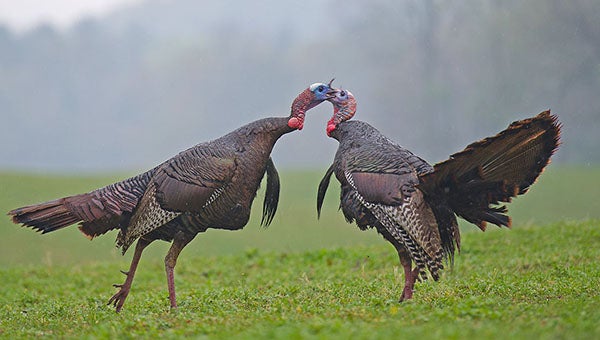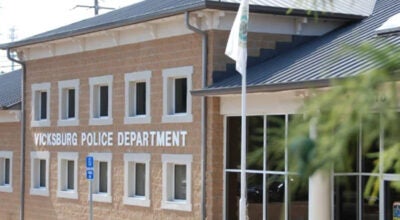Spring turkey season forecasts tough year; poultry surveys, recommendations could change the outlook
Published 5:01 pm Tuesday, March 21, 2023

- (Photo courtesy of MDWFP)
By Hunter Cloud | The Daily Leader
JACKSON — Spring turkey season opened March 15 as it has for the last decade, but the early start may come to an end.
Turkey Program Director Adam Butler presented a series of recommendations in an educational session with the Mississippi Department of Wildlife, Fisheries and Parks commission last month.
Among his recommendations included a mandatory tagging system, requiring the purchase of a turkey stamp and closing the fall season. He also brought forth a proposal to shorten the turkey hunting season by as little as two to eight days.
Within the last five years, Nebraska, Kansas, Oklahoma, Arkansas, Louisiana, Ohio, Tennessee, Alabama, Georgia and South Carolina have all tweaked their spring turkey seasons. Butler’s recommendation to shorten the season would place Mississippi on the list. His proposal is to return to the pre-2005 season framework of starting on the Saturday closest to March 20.
“Turkey populations go up and down regardless of what you do,” Butler said. “Changing different things about the spring does nothing. Right now, it takes longer to kill birds that first week because the birds aren’t gobbling or cooperating. Waiting a week would have better harvest rates and hunter experiences.”
Butler added it would eliminate confusion on when opening day is while also aligning youth season with spring break on the week of March 15. The primary goal of the season change is to give hunters a better opportunity to harvest birds during higher gobbling activity.
It is important to note these recommendations will not be official recommendations until April 2023’s commission meeting. Butler said they are talking about the recommendations now to open the door for communication prior to the April commission meeting.
His recommendation has little to do with helping the turkey population. Models show little change in the long-term turkey population if you drop the bag limit to one turkey or shorten the season to just a month. Mississippi should retain the three-bird bag limit and instead focus efforts on areas to help the population, Butler recommended.
Even with a different spring season framework, Mississippi would still have the longest turkey season in the south. March 23rd would be the latest the season would start and March 17 would be the earliest the season could start under the recommendation.
Population trends
Mississippi recorded its third-best hatch since summer brood surveys began in 1994.
MDWFP turkey program coordinator Adam Butler said this fall was one of the best turkey hatches they have had in his 15 years with the department during his educational session for the MDWFP commission meeting in mid-February. Statewide, there was an average of 2.3 poults per hen while the southwest region had 2.5 poults per hen.
“There were a lot more turkeys in the woods this fall than there were in the past 10 years. I have heard of places that didn’t have birds before doing well,” Butler said. “Hopefully this is a trend.”
Turkey populations have a tendency to fluctuate due to a variety of factors, including predation, weather, harvest and fall and winter survival rates. However, Butler said he is more optimistic than he has ever been about the outlook for Mississippi’s turkeys. Southwest Mississippi will likely have great seasons in 2024 and the following years.
During the educational session, Butler made a few recommendations that are aimed to help turkey numbers increase in the state. Commissioner William Mounger asked if the recommendations were something they would act upon in a few months. Butler explained they would make the program’s formal recommendations at the April meeting for the 2024 season. The educational session just opens the door for conversation.
“With turkey season we know you will get questions and now is the time to have this conversation,” Butler said. “We have the full support of Mississippi’s chapter of the National Wild Turkey Foundation on our recommendations.”
He prefaced his recommendations with a look at hunter participation, harvest trends and population estimates. Participation has doubled in the last 10 years with 60,000 hunters afield while harvests and population estimates have had a slight decline.
Fighting poachers
One recommendation is moving to a statewide tagging system. Currently, hunters are required to report their harvests through Game Check either on the MDWFP website or phone application.
“It is a response to knowing we have a serious problem with outlaws and people violating bag limits,” Butler said.
Law enforcement has done a good job of investigating and uncovering illegal turkey harvests over the last few years, he said. Citizens can also help by reporting violations by dialing (1-800-BE-SMART) or visiting the MDWFP website to report a violation.
One of the more recent cases affecting Lincoln County came in 2020. Four people were arrested for poaching nearly 100 turkeys in Lincoln, Copiah, Franklin, Jefferson and Claiborne Counties and trespassing on 15 properties during the 2019 season. Those people were Kenneth Ray Britt of Wesson, Tony Grant Smith of Wesson, Allen Shelton Morgan of Brookhaven and Breanna Jeanine McKay of Wesson. The investigation uncovered federal wildlife violations.
According to MDWFP surveys, one out of five hunters had first-hand knowledge of someone who committed a turkey violation during the season. The data showed the leading violation hunters knew about was outlaw-harvesting over the legal limit.
Currently, game check shows 40 percent of the estimated turkeys harvested despite being a mandated checking system by state law. Butler said they have to do something to minimize illegal harvests.
“Big picture it would help and the commission has full authority to permit tagging for turkeys,” Butler said. “Tagging is supported by hunters as is the establishment of a turkey stamp. The stamp would require legislative action to make happen and would allow the agency to address turkey management needs and would fully fund the tagging system.”
Helping out hens
Butler made a recommendation to close the fall season which would affect Adams, Amite, Claiborne, Copiah, Hinds, Franklin, Jefferson, Lincoln, Madison, Warren, Wilkinson and Yazoo Counties. He said there is not enough participation and a change would positively impact the turkey population.
Mississippi’s Fall Turkey season is currently only permitted on private lands and landowners or leaseholders must submit an application to the MDWFP in Jackson. Hunters are able to take two birds of either sex.
Data collected from this fall showed a majority of fall turkey harvests weren’t even in the legal zones, he said. Butler explained the forecast models done through Mississippi State University showed changes to the spring season did not impact the turkey population as much as closing the fall season would.
“There just isn’t enough activity and it would help with hen survival,” Butler said. “We can’t continue to allow legal hen harvest. We undertook this process looking at everything. We arrived that nothing about the spring season really affects the number of turkeys going forward. Closing the fall season would help turkeys. Forecast models show increasing hen survival by 2 percent had a 2.5 times increase on the turkey population after 10 years. It was hard to justify having the fall season.”
Commission Chairman Bill Cossar spoke to changes he has seen on his property by waiting a few more weeks to cut hay. By waiting until July 1st to cut hay, he said he has seen an increase in birds on his property.
Butler said a study in Tennessee showed about 12 percent of turkey nest losses are due to mowing practices. He said the majority of nesting is from mid-April to mid-May in Mississippi so waiting until July to mow is beneficial to birds.





